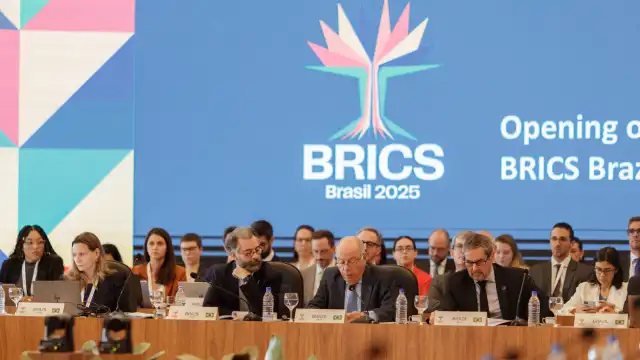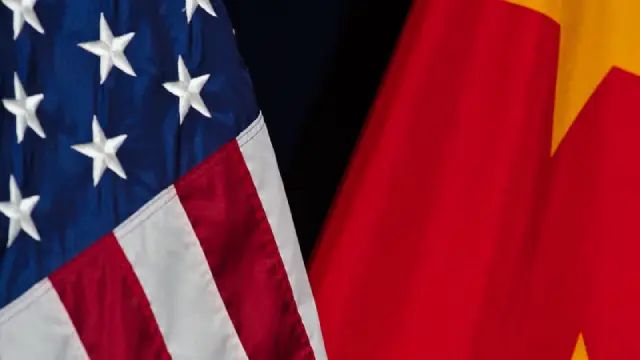BRICS welcomed its 11th member at the beginning of this year. The inclusion of Indonesia as just another leader of Global South countries and the largest economy in the Association of Southeast Asian Nations brings new weight to the appeal of the bloc.
BRICS countries are now home to roughly 3.3bn people, ie, over 40% of the global population, while the BRICS economies account for an estimated 37.3% of global gross domestic product based on purchasing power parity. In comparison, the G7 economies account for roughly 28.4%.
In 2001, Goldman Sachs economist Jim O’Neill published a game-changing paper that detailed how four emerging economies — Brazil, Russia, India and China — were set to reshape the global economy in the coming years.
Following that, the inaugural BRIC leaders’ summit in Russia’s Yekaterinburg in 2009 declared: “The dialogue and cooperation of the BRIC countries is conducive not only to serving common interests of emerging market economies and developing countries, but also to building a harmonious world of lasting peace and common prosperity.”
In many ways, the BRICS mechanism has been fulfilling that mission ever since.
Chinese President Xi Jinping brought about the concept of “greater BRICS” cooperation for the bloc in his remarks at last year’s leaders’ summit in Kazan, Russia, when the bloc saw a major expansion of member nations.
He suggested the bloc embark on the task of building itself into “a primary channel for strengthening solidarity and cooperation among Global South nations and a vanguard for advancing global governance reform” by focusing on five areas of work: security, innovation, green development, global governance and people-to-people exchanges.
As Chinese Premier Li Qiang is about to begin his trip to Rio de Janeiro for this year’s leaders’ summit, the international community needs to be reminded that “greater BRICS” cooperation is becoming more relevant for our world today.
BRICS countries have been seeking to establish a united front of emerging economy perspectives in multilateral institutions and have tried to channel more support to these economies, especially on critical new issues like climate and artificial intelligence.
In 2015, the bloc founded the New Development Bank, or NDB, a multilateral development lender based in Shanghai, which has funded various projects ranging from increasing liquified natural gas transportation capacity in China to modernising freight rail systems in South Africa.
In its ten-year history, the NDB has approved loans for roughly 120 projects worth around $40bn.
Despite warnings of a recession from economists, the world’s largest economy is now celebrating its tariff spree, creating enormous uncertainty and a significant decline in market confidence worldwide.
It is therefore even more urgent for BRICS economies to step forward and enhance their push for multilateralism. And with more funding for member country development projects in local currencies, agencies like the NDB can bring useful and reliable supplements to the precarious dollar system.
With more members included and spread in more regions of the world, it is inevitable that the BRICS mechanism, initially a global governance platform, takes on more responsibilities, especially in the area of security.
On the Ukraine crisis, China, Brazil and other like-minded countries of the Global South formed in 2024 the “Friends for Peace” group to work towards ending the war in Ukraine.
The six-point consensus presented by China and Brazil on the Ukraine crisis in the same year won support from dozens of Global South countries.
Adding to the Ukraine crisis, the Israel-Hamas war is still ongoing, while the Israel-Iran ceasefire remains fragile.
What makes things all the more tragic is that the current international debate is scarcely focused on respecting a nation’s sovereignty, nor on the millions of lost civilian lives during the wars.
With important regional stakeholders like Egypt, the UAE and Saudi Arabia in the bloc, the BRICS mechanism should and can help bring more stability to Middle Eastern security issues.
BRICS is undoubtedly the most important platform for solidarity and cooperation among emerging markets and developing countries in the world today. It is important for multilateral organisations, such as BRICS, to evolve and reposition themselves under the ever-changing global geopolitics.
The world today calls for “greater BRICS,” and by renewing its mission, the BRICS mechanism will continue to thrive.
[Views expressed don’t express East Post’s. Credit: CGTN]
Join our channels on Telegram and WhatsApp to receive geopolitical updates, videos and more.






